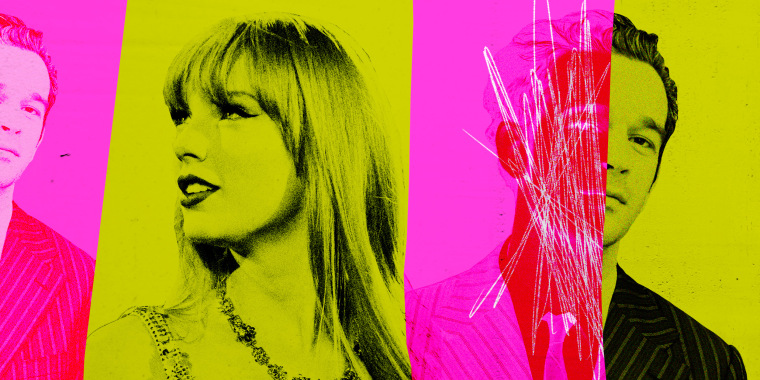It’s a bummer when your best friend starts dating an apparent dirtbag. God, you think, what does she see in him? He looks like he smells of stale coffee and cigarettes. He looks like a hipster stork. You’ve heard him brag about how he watches humiliation porn. And don’t forget the racism and antisemitism.
Except Taylor Swift is not your best friend.
I don’t know what prompted the breakup, but I doubt it was a tearful Swiftie on TikTok.
When news broke this week that Swift and The 1975 lead singer Matty Healy had ended their brief relationship, social media celebrated in a way that was notable — and a little deranged. (And immediately started speculating about her next fling.) Just hop on Twitter and read the comments about how Swift had really heard her fans and tossed that loser in the trash. I don’t know what prompted the breakup, but I doubt it was a tearful Swiftie on TikTok. Still, imagine feeling like you have that kind of influence over a person you’ve never interacted with. Or that kind of personal investment.
Swift is — in some ways — an unusually private celebrity. It feels like her every move is carefully choreographed. We hardly ever see her messy, incoherent, or intentionally challenging. But fans feel like they know Swift because she writes prolifically about romantic relationships. It’s hardly novel, a musician writing about love and loss. Still, fans pore over these songs. They find Easter eggs in the lyrics, do complex analysis aligning certain ex-boyfriends with specific details. And because language is subjective and Swift is arguably both elusive and slyly encouraging of these readings, the meanings are ever-shifting. Depending on who you ask, she is everything from an Aryan pinup girl to a queer icon. In short, she is the perfect parasocial fantasy subject.
The term “parasocial interaction” has been around since sociologists Donald Horton and Richard Wohl theorized on the phenomenon in the 1950s. A parasocial interaction refers to a relationship in which a consumer comes to believe that media personalities are their intimate friends and that an emotional connection is shared. The phrase has become more popular recently with the rise of pop culture super fans, or stans. These fans can become incredibly invested in their favorite celebrity’s real-life relationships, and devastated if those relationships implode.
See, for example, when comedian John Mulaney separated from his wife Anna Marie Tendler in May of 2020 and began dating actor Olivia Munn. While celebrity relationships have always been fodder for gossip and people are naturally curious about their favorite stars (this writer included), public response regarding the Mulaney situation was noteworthy. Critics suggested that this was because Mulaney’s public persona made it seem like he was your buddy, your pal, a friend you could relate to. And he made his personal life part of his public persona by integrating details about his wife and French bulldog Petunia into his comedy routine. When he violated the parasocial social contract by not living up to that fantasy, things fell apart. It’s similar with Swift — particularly, this situation with Healy.
Swift stepping out with Healy disrupted fan notions of her and the values they believe she holds dear. She’s dating a guy who makes racist remarks? Who unrepentantly laughs about violently objectifying women? Is this who you are, Taylor? And if this is who you are, who am I?
Things got so intense that a group of Swifties circulated an open letter telling other fans to #SpeakUpNow.
Things got so intense that a group of Swifties circulated an open letter telling other fans to #SpeakUpNow and condemn the relationship: “He has been involved in acts and controversies that deeply trouble us,” the letter says. “We urge you to reflect on the impact of your own and your associates’ behavior and engage in genuine self-reflection.”
Rapper Ice Spice, who was called a “chubby Chinese lady” on a podcast where Matty Healy was a guest, was brought in to share the stage with Swift in East Rutherford, New Jersey. Some speculated this act was a professional olive branch, others an empty, performative gesture to both Ice Spice and fans who were disturbed by Healy’s behavior (he has since offered both an apology and a non-apology for laughing about the rapper with the podcast hosts).
Poets talk a lot about how the speaker of the poem is not the writer of the poem. You’ve got to put distance between them. That’s healthy for artists and fans. You don’t know anything about Taylor Swift except what she carefully curates and puts out into the world. Her songs may speak to you, but she directly is not. Proclamation of ownership over a stranger and her love life, the fantasy that our whispers reach Swift’s ears and she heeds our pleas, is problematic.
Parasocial relationships can show the beauty of human emotion, our capacity for empathy, and our ever-expanding desire to connect. On the darker side, they reveal our desire for control, our capacity for cruelty, and our instincts to possess. If the parasocial fantasy is punctured, you might have to make an ethical choice that forces you to confront the dissolution of that illusion — and, more importantly, yourself and what you’re willing to accept.
CORRECTION (June 8, 2023, 3:00 p.m. ET): A previous version of this article misstated who called Ice Spice a “chubby Chinese lady.” It was podcast hosts Adam Friedland and Nick Mullen, not Matty Healy.
